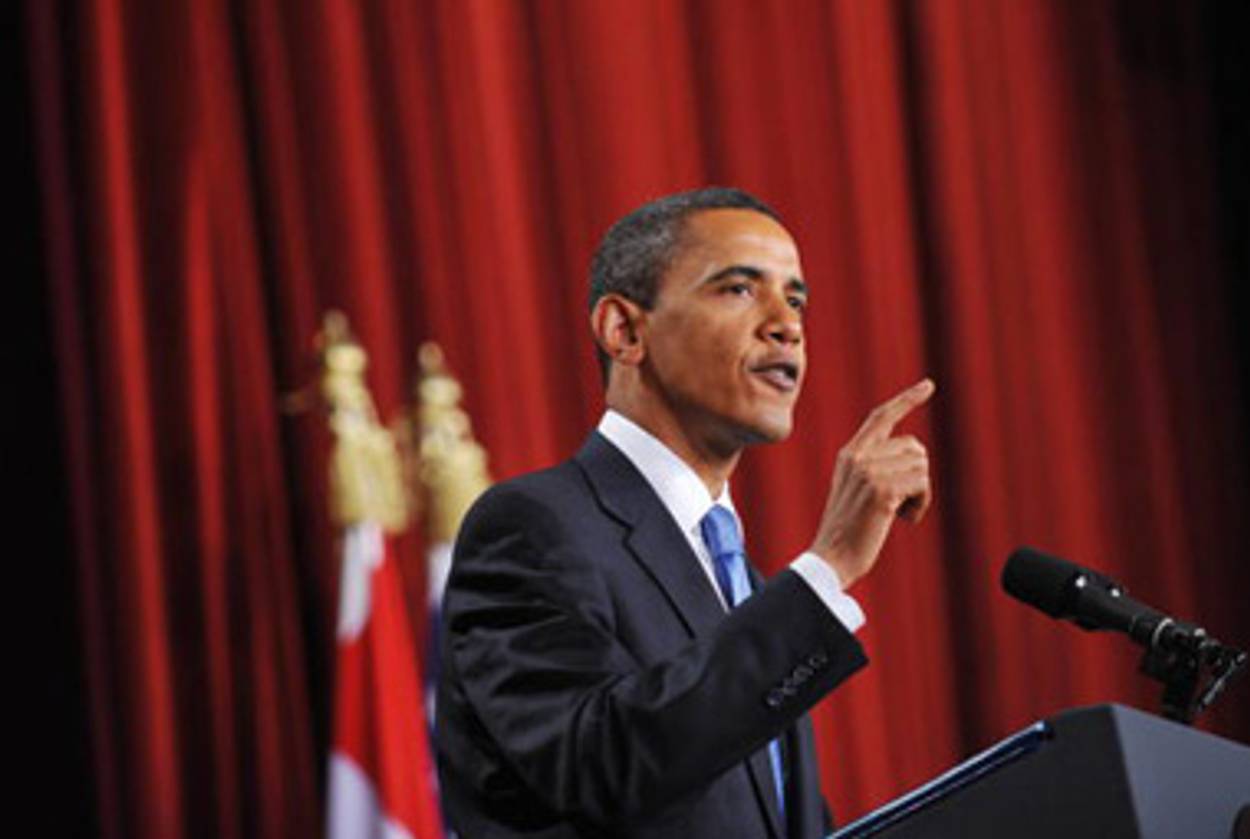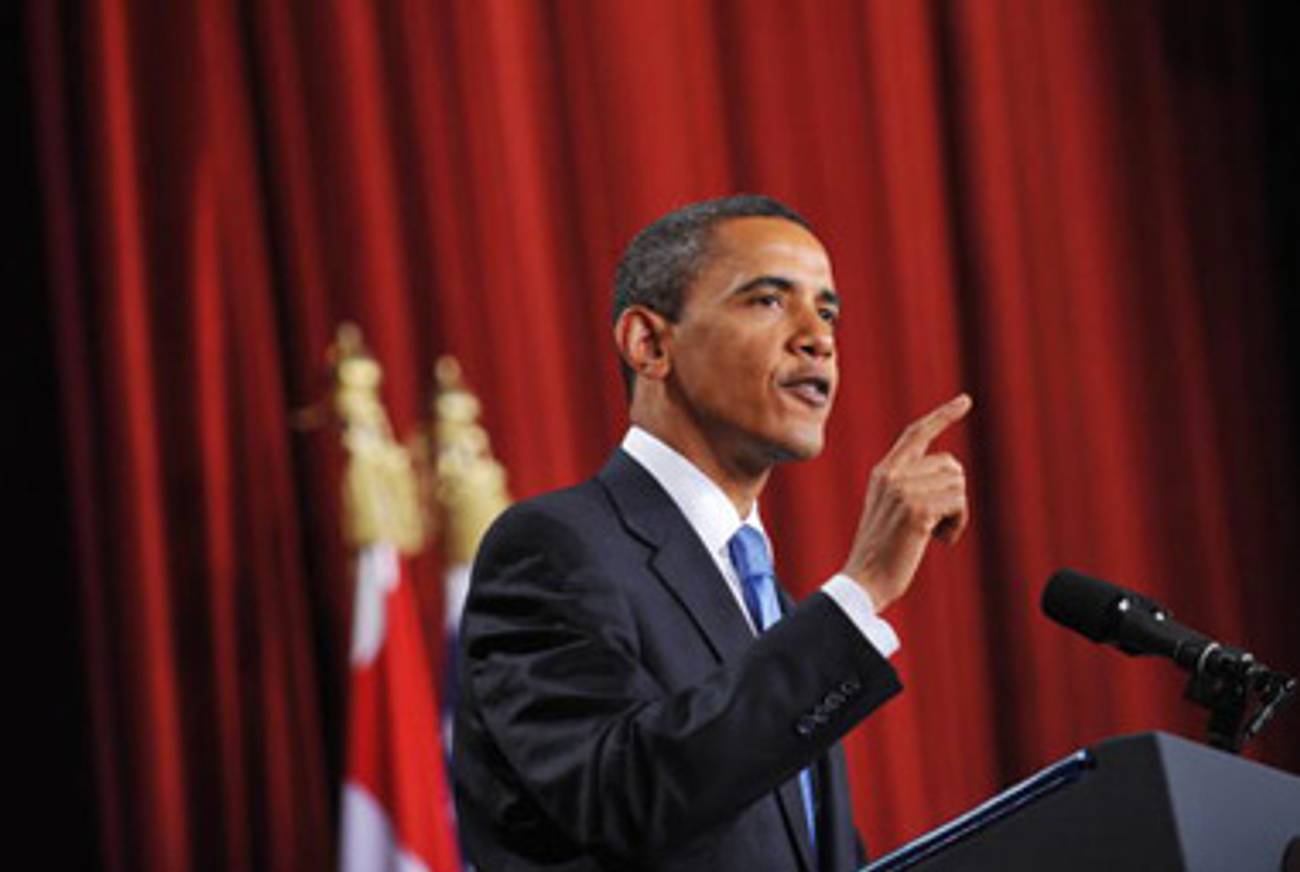Bush’s Lesson for Obama
One president’s Knesset address, and how the other’s Cairo speech compares




With so many Jews voicing their unease—some publicly, some privately—over President Obama’s speech at Cairo and his words last week amid a desperate struggle for democracy now under way in Iran, I retreated to my study with a copy of the remarks President Bush delivered to the Knesset on the 60th anniversary of the Jewish state. Although he delivered them but 13 months ago, it is possible to predict that his words will stand as a measure for those who follow him as America’s tribune.
Bush spoke on May 15, 2008. He began by quoting Ben Gurion’s proclamation, declaring that Israel possessed a “natural right of the Jewish people to be masters of their own fate.” The president of the United States called it “the redemption of an ancient promise given to Abraham and Moses and David—a homeland for the chosen people: Eretz Yisrael.” He recalled how America recognized the Jewish state 11 minutes after the declaration. He characterized the “alliance between our governments” as “unbreakable” but he asserted that the “source of our friendship runs deeper than any treaty.” He spoke of the “bonds of the Book” and the “ties of the soul.”
The president recalled that when William Bradford stepped off the Mayflower, he quoted the words of Jeremiah: “Come let us declare in Zion the word of God.” He spoke of how the founders of America “saw a new promised land” and gave their towns names like Bethlehem and New Canaan. His words were those of a man who has read and thought about how the idea of Israel was intertwined with the idea of America going back to James Madison, say, or Samuel Adams and of why, as he put it to the Knesset, “many Americans became passionate advocates for a Jewish state.”
Bush also spoke of the “suffering and sacrifice [that] would pass before the dream was fulfilled.” He spoke of the “soulless men” who perpetrated the Holocaust, and he quoted Elie Wiesel. He described the joyous tears of a “fearless woman raised in Wisconsin,” Golda Meir, when the dream of a state was fulfilled. He spoke of touching the Western Wall, seeing the sun reflected in the Sea of Galilee, of praying at Yad Vashem and visiting Masada and he swore the oath that Israeli soldiers swear: “Masada shall never fall again.”
Then the president turned to the principles that guide American policy—“shared convictions,” he called them, “rooted in moral clarity and un-swayed by popularity polls or the shifting opinions of international elites.” That led to an articulation of democracy as “the only way to ensure human rights,” and he spoke of how the United Nations has singled out Israel as a target of its human rights resolutions and declared that Americans consider it “a source of shame.”
He expressed the belief that George Washington had spoken of more than two centuries previously—that, as Mr. Bush put it, “religious liberty is fundamental to a civilized society.” He declared that Americans “condemn anti-Semitism in all forms—whether by those who openly question Israel’s right to exist, or by others who quietly excuse them.” He disputed that terrorists acting in the name of religion are religious men. “No one who prays to the God of Abraham could strap a suicide vest to an innocent child, or blow up guiltless guests at a Passover Seder, or fly planes into office buildings filled with unsuspecting workers,” he said. “They accept no God before themselves.”
He spoke specifically of Hezbollah, Hamas and the Iranians and of calls for Israel to be wiped off the map. “There are good and decent people who cannot fathom the darkness in these men and try to explain away their words.” He called such reactions “natural” but “deadly wrong.” He remarked on how “[s]ome seem to believe that we should negotiate with the terrorists and radicals, as if some ingenious argument will persuade them they have been wrong all along.” Then he quoted the American senator who, in 1939, declared, “Lord, if I could only have talked to Hitler, all this might have been avoided.”
This is where he warned of the “false comfort of appeasement.” He rejected the suggestions of some that “if the United States would just break ties with Israel, all our problems in the Middle East would go away.” He argued that permitting “the world’s leading sponsor of terror to possess the world’s deadliest weapons would be an unforgivable betrayal for future generations.” Then he marked the point that was so prescient in respect of what is happening on the streets of Tehran today.
“Leaders who are accountable to their people will not pursue endless confrontation and bloodshed,” he said. “Young people with a place in their society and a voice in their future are less likely to search for meaning in radicalism. Societies where citizens can express their conscience and worship their God will not export violence; they will be partners in peace. The fundamental insight, that freedom yields peace, is the great lesson of the 20th century. Now our task is to apply it to the 21st.”
So the president declared that America “must stand with the reformers working to break the old patterns of tyranny and despair” and “give voice to millions of ordinary people who dream for a better life in a free society.” He warned of “violent resistance.” But said with faith in our ideals he could imagine “Israel celebrating the 120th anniversary as one of the world’s great democracies, a secure and flourishing homeland for the Jewish people.” And he foresaw the rest of the Middle East as having been transformed, the terrorists defeated, and the region entering “a new period of tolerance and integration.”
Bush’s remarks were greeted by derision and controversy in the Arab press. One website that tracks foreign press reports ran a headline calling the speech an “act of lunacy” and quoted the chairman of Egypt’s Al-Ahram newspaper as complaining that the president’s remarks “appeared to have been lifted almost word-for-word from the Torah.” When reporters asked Senator Joseph Biden about Mr. Bush’s speech, the then-Chairman of the Foreign Relations Committee reacted by swearing, according to the New York Times. The Democrats were apparently under the impression that Bush was talking about President-to-be Obama. But now blood is running in the streets of Tehran and a new American president is debating whether to speak in a way that might be construed as meddling. One way to judge whatever he says would be to compare it to the standard President Bush set a year ago in Jerusalem.
Seth Lipsky, formerly editor of the English-language edition of the Forward, is founding editor of The New York Sun.
Seth Lipsky, formerly editor of the English-language edition of the Forward, is founding editor of The New York Sun.